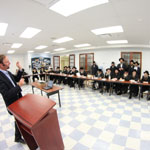Medical Examiner's Office Provides Ground Zero Halachic Insight to Rabbonim
July 17, 2012

Recently, Misaskim hosted Rabbi Yechezkel Roth, Shlita, Misaskim's rav and the head of the Vaad Mishmeres H'kahuna, together with a large group of rabbonim. The gathering took place at Misaskim's headquarters and was dedicated to the process of determining the halachic status of Kohanim at Ground Zero and its memorial museum.
Dr. Bradley Adams, who heads the Forensic Anthropology Department at the New York Medical Examiner's office, which is currently in charge of all recovery operations at Ground Zero, presented an hour-long outline of all aspects of the ongoing recovery operation. His presentation was recently used as an educational tool for coroners and forensic experts from around the world at the International Conference for Medical Examiners in April.
Dr. Adams helped the rabbonim understand the scope of the clean-up operations. He explained that about 609,000 cubic yards of material is being sifted through in an effort to recover human remains that may have been missed after the initial clean-up activities at the site. He mentioned that in addition to meticulously examining surrounding roof tops and buildings, the Medical Examiner's Office has cleaned out about 700 manholes in the area. In some instances, it became necessary to dig down more than 10-feet to determine whether human remains may be present. Dr. Adams' in-depth presentation will help rabbonim evaluate the possible sheilos that may arise. In this way, once a p'sak is reached, everyone will be certain about the halachic status of the site.
Dr. Adams and the rabbonim also discussed the future memorial that is being built at the World Center site in which the unidentified human remains of many, many hundreds of victims are expected to be buried. In an effort to ascertain how the burial process will impact kohanim who may visit the museum, the rabbonim requested further information about the planned methods of burial as well as details of the structure that would be built to house these remains. Many more issues surfaced at the meeting and it was agreed that no psak would be reached concerning the museum until the rabbonim have compiled a list of further questions that will be presented to the Medical Examiner's office.
Misaskim would like to thank the administrators and staff of the Medical Examiner's Office for their ongoing dedication and sensitivity to our community's needs.
View Photos
Dr. Bradley Adams, who heads the Forensic Anthropology Department at the New York Medical Examiner's office, which is currently in charge of all recovery operations at Ground Zero, presented an hour-long outline of all aspects of the ongoing recovery operation. His presentation was recently used as an educational tool for coroners and forensic experts from around the world at the International Conference for Medical Examiners in April.
Dr. Adams helped the rabbonim understand the scope of the clean-up operations. He explained that about 609,000 cubic yards of material is being sifted through in an effort to recover human remains that may have been missed after the initial clean-up activities at the site. He mentioned that in addition to meticulously examining surrounding roof tops and buildings, the Medical Examiner's Office has cleaned out about 700 manholes in the area. In some instances, it became necessary to dig down more than 10-feet to determine whether human remains may be present. Dr. Adams' in-depth presentation will help rabbonim evaluate the possible sheilos that may arise. In this way, once a p'sak is reached, everyone will be certain about the halachic status of the site.
Dr. Adams and the rabbonim also discussed the future memorial that is being built at the World Center site in which the unidentified human remains of many, many hundreds of victims are expected to be buried. In an effort to ascertain how the burial process will impact kohanim who may visit the museum, the rabbonim requested further information about the planned methods of burial as well as details of the structure that would be built to house these remains. Many more issues surfaced at the meeting and it was agreed that no psak would be reached concerning the museum until the rabbonim have compiled a list of further questions that will be presented to the Medical Examiner's office.
Misaskim would like to thank the administrators and staff of the Medical Examiner's Office for their ongoing dedication and sensitivity to our community's needs.
Back to previous page


